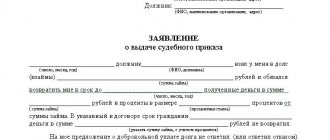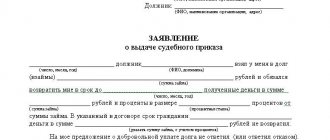Close
on the market since 2006
- EN
- FR
- GER
- Every day (9:00-21:00)
seven days a week - WRITE
- CALL
+7-495-506-90-04 +7-812-679-09-99
- WHATSAPP
+7-925-506-90-04
- COVID-19
- About Us
- our history
- Our principles
- our team
- Our judicial practice
- our clients
- Our details
- Cooperation with us
- Career
- Business
- Russia Moscow
- Paris
- NY
The judge does not always make a decision or determination.
Among the varieties of court orders, there is another interesting type - court order .
What is this court order, what types of demands are it issued for, and what can you do with a court order in hand? We will try to answer these and some other questions in this article. If we follow the interpretation of the legislation, then a court order is a court decision issued by a single judge on the basis of an application for the collection of sums of money or for the recovery of movable property from the debtor according to the requirements provided for in Article 122 of this Code. At the same time, it should be taken into account that, according to Part 2 of Art. 121 of the Code of Civil Procedure of the Russian Federation, a court order is also an executive document according to which a monetary obligation can be recovered.
What are the requirements for a court order?
In accordance with Art.
122 of the Code of Civil Procedure of the Russian Federation, a court order is issued if: the demand is based on a notarized transaction;
the claim is based on a transaction concluded in simple written form;
the claim is based on a protest of the bill of exchange made by the notary for non-payment, non-acceptance and undated acceptance;
a claim has been made for the collection of alimony for minor children, not related to establishing paternity, challenging paternity (maternity) or the need to involve other interested parties;
a demand was made to collect from citizens arrears of taxes, fees and other obligatory payments;
a demand has been made for the recovery of accrued but not paid wages to the employee;
A territorial body of the federal executive body responsible for ensuring the established procedure for the activities of courts and the execution of judicial acts and acts of other bodies has declared a demand for the recovery of expenses incurred in connection with the search for the defendant, or the debtor, or a child taken from the debtor by a court decision.
On the one hand, everything is quite simple: the law lists a list of disputes for which a court order is issued. In practice, not everything is so simple. Judges do not always want to accept an application for a court order.
According to Part 1 of Art. 125 of the Code of Civil Procedure of the Russian Federation, the judge refuses to accept an application for a court order on the grounds provided for in Articles 134 and 135 of this Code. In addition, the judge refuses to accept the application if: a demand is made that is not provided for in Article 122 of this Code; the place of residence or location of the debtor is outside the Russian Federation; documents confirming the stated claim have not been submitted; from the application and submitted documents it is clear that there is a dispute about the right; the stated claim has not been paid with state duty.
This provision provides a large gap for refusing to accept an application for a court order. Often judges refuse to issue a court order on the grounds that there is a dispute over the right or failure to provide any documents. Thus, the conclusion suggests itself: even if there are grounds for issuing a court order, no one guarantees that the court will issue it.
Mandatory payment
Types of state fees are divided depending on the type of claim.
In addition to statements of claim, the state fee also pays for intermediate procedural actions during the consideration of the case.
In accordance with the Code of Civil Procedure of the Russian Federation and the Tax Code of the Russian Federation, payment of state duty is a mandatory condition when applying to the judicial authorities. Exceptions to this rule are the category of claims and plaintiffs who are legally exempt from paying state fees. All these categories will be given below.
Contents and form of an application for a court order
The application for a court order must indicate:
1) the name of the court to which the application is submitted;
2) the name of the claimant, his place of residence or location;
3) the name of the debtor, his place of residence or location;
4) the claimant’s claim and the circumstances on which it is based;
5) documents confirming the validity of the claimant’s claim;
6) list of attached documents.
In the case of a claim for movable property, the application must indicate the value of this property.
It is worth remembering that the requirements of the Code of Civil Procedure of the Russian Federation regarding the form of the specified application must be strictly observed without any deviations. Failure to comply with the form is grounds for returning the application and, as a consequence, loss of time and nerves.
About the calculator
The method of resolving disputes by going to court is becoming very common among Russians. Filing a statement of claim is necessarily accompanied by payment of a state fee, the amount of which is regulated by several legislative acts, which can be quite difficult to understand.
The state duty calculator for courts of general jurisdiction can significantly facilitate the plaintiff’s task of establishing the specific amount that he must pay as state duty.
Issuance of a court order to the claimant
If the debtor does not submit objections to the court within the prescribed period, the judge issues to the claimant a second copy of the court order, certified by the official seal of the court, to present it for execution.
At the request of the claimant, a court order may be sent by the court to a bailiff for execution. Thus, the claimant under a court order, from the moment he receives the court order in hand, has the right to submit it for collection to the bailiff service. In other words: a court order is also an executive document. In case of collection of state duty from the debtor for the income of the corresponding budget, on the basis of a court order, a writ of execution is issued, which is certified by the official seal of the court and sent by the court for execution in this part to the bailiff.
In any case, even if it seems to someone that the issues regarding the issuance of a court order by the court are clearly defined by law, you still should not rely on fate; it is better to entrust this matter (writing an application for a court order) to a professional: a lawyer with extensive experience and a wealth of knowledge. Our company deals with all issues of legal representation of clients and is interested in the correct, competent and high-quality provision of legal services. We will help you draw up a statement that will help the court draw the right conclusions in favor of our client. Our goal is your result!
Using the calculator
To obtain information about the amount of the state duty, you must enter data into the calculator regarding the category of the claim and the material claim contained in the claim (for claims of a material and property nature).
The amount of the claim, that is, the material claim presented to the defendant, will become the basis for calculating the state duty based on the interest rate established by the Tax Code for such a category of claims.
Claims that do not contain material claims against the defendant are subject to a state duty at a fixed rate, and to find out the amount of the state duty, you will need to enter the essence of the civil legal relationship on the basis of which the claim is brought into the calculator.
Disputes with material claims
The Tax Code of the Russian Federation differentiates the state duty according to the cost of the claim. The interest rate is set depending on the amount of the claim made against the defendant:
- up to 20,000 rubles - paid with a state duty in the amount of 4% of the claim price;
- from 20 to 100 thousand rubles – 3% up to 20,000 rubles +800 rubles;
- from 100 to 200 thousand rubles – 2% of the requirement up to 100 thousand +3200 rubles;
- 200 thousand rubles up to a million – 1% of the requirement up to 200 thousand rubles + 5200 rubles;
- over 1 million rubles – 0.5% of 1 million + 13,200 rubles. The amount of state duty should not exceed 60 thousand rubles.
Disputes without collection requirements
Claims without material claims against the defendant are paid with state duty at a fixed rate. Differentiation is carried out according to the type of civil law relations.
- claims arising from family law – 600 rubles;
- Applications for alimony are paid with a state duty in the amount of 150 rubles. by the defendant after the court decision (ruling);
- applications with a simultaneous demand for the collection of alimony and funds for the maintenance of the plaintiff (plaintiff) are paid with a state fee of 300 rubles by the defendant after the decision is made.
In order for the calculator to tell you the required amount of state duty at a fixed rate, you should inform it about the category of civil law relations.
Amounts of state duty on claims
For property disputes, the amount of the state duty is determined by the size of the declared material claims. In order for the calculator to display the correct result, you only need to tell it the amount of the claim. All interest rates necessary for correct calculation are entered into the calculator algorithms.
For non-property disputes, the legislator has established fixed amounts of state duty, so the calculator will need not the amount of the claim, but its type.
The categories of non-property disputes include:
- claims for contractual disputes;
- claims arising from administrative law, as well as statements arising from disputes with authorities;
- claims arising from copyright;
- bankruptcy claims;
- applications for the repeal of by-laws adopted by authorities and officials;
- statements concerning the establishment of legal facts.
What are legal costs?
Costs associated with the trial may be mandatory - that is, they will be borne by the participant in the process in any case - as well as those that appear unexpectedly. As mentioned above, Article 94 of the Code of Civil Procedure provides a list of what can be considered legal costs:
- legal payments;
- travel expenses for people who must appear at the meeting;
- expenses for finding the defendant;
- costs of carrying out the sentence;
- compensation payments;
- other costs.
The costs of legal proceedings can be quite large. Theoretically, they can also include the costs of drafting court documents, making copies, and much more.
As for the expenses associated with the appearance of witnesses at the meeting and with the search for the defendant, there is a calculation scheme. Witnesses and specialists who take part in the trial can expect reimbursement of expenses.
For example, costs for food, accommodation (if people come from another city), transport and work, if we are talking about specialists. The more complex and expensive the specialist’s work, the higher the costs of litigation.
Also, this category of court participants can be financially compensated for the time they spent. However, in reality, if a witness or specialist lives in the same city or region where the proceedings are taking place, you cannot count on compensation.
Who pays compensation for legal expenses?
Typically, the cost of a lawsuit is the responsibility of the losing party.
But for this, the judge must make an appropriate decision. However, there are some peculiarities here too. For example, if a claim is partially successful, the plaintiff may only be able to recover the costs associated with the successful claim. The defendant can count on reimbursement of legal costs in proportion to those claims that the applicant was denied.
If, for example, witnesses were brought to participate in a civil trial on the initiative of a judge, and not by one of the parties to the proceedings, then the costs associated with this will be paid from the federal budget. This is discussed in more detail in Article 98 of the Code of Civil Procedure.
How to calculate and pay
To calculate the required amount depending on the circumstances, it is most convenient to use a special calculator, which can be found on the website of the desired arbitration court. If the claim simultaneously contains both property and non-property claims, it is necessary to calculate and pay simultaneously the amount of the fee established for both one and the other claims.
Details for the transfer can be found on the official website of the arbitration court. After completing the calculations, the system immediately allows you to select the “Fill out payment order” function and generate a payment document. If submitting documents electronically, you must also provide proof of payment of the fee. If it turns out that it was paid in a smaller amount than necessary, the arbitration judge will leave the application without progress and set a deadline for eliminating the deficiencies. The meeting will be scheduled only after payment in full has been received.
How to pay the fee when submitting an application
Applying to the court. order, you must attach proof of payment of the state fee. You can pay it:
- in post offices;
- through bank branches;
- through the Federal Tax Service website;
- through banking applications.
When paying via mail or bank branch, you will receive a receipt. It must be attached to the application.
When paying via the Internet, an electronic payment document is generated. It can be printed and attached to the application. Verification of electronic and regular payments is the responsibility of court staff. For this purpose, the details specified in the payment document or in its copy are used (KBK, TIN, name of the recipient, etc.).
Cassation appeal against the decision of the arbitration court on an economic dispute
The state fee for a cassation appeal in the arbitration process is also set at 50% of the state fee for filing a claim of a non-property nature - 3,000 rubles (subparagraphs 4 and 12 of paragraph 1 of Article 333.21 of the Tax Code of the Russian Federation).
The state duty is set at the same rate for applicants - legal entities and individuals - individual entrepreneurs.
The state fee is paid for filing a cassation appeal in relation to:
- decisions and rulings of the arbitration court in the case;
- rulings on refusal to accept a claim;
- rulings to leave the claim without consideration,
- in the case of challenging the decisions of the arbitration tribunal,
- in cases of issuing writs of execution for the forced execution of arbitration court decisions, as well as refusal to issue writs of execution.
Payment of state duty for other acts of the arbitration court depends on whether the corresponding application was paid with state duty during consideration in the first instance.
Payment through an accountable person
Accounting for such settlements through an accountable person is carried out using account 208.91 “Settlements with accountable persons for the payment of duties and fees.”
These calculations for the payment of state duty through an accountable person are reflected in budget accounting with the following entries:
| Contents of operation | Debit | Credit |
| Accountable amounts were issued (transferred) for payment of state duty | ||
| from the institution's cash desk | 1 208 91 567 | 1 201 34 610 Off-balance sheet account 18 |
| to the institution's settlement (debit) card | 1 210 03 567 Off-balance sheet account 17 | 1 304 05 291 |
| 1 208 91 567 | 1 210 03 667 Off-balance sheet account 18 | |
| Expenses for payment of state duty have been accepted for accounting (based on the advance report approved by the head) | 1 401 20 291 | 1 208 91 667 |
| The unused balance of the accountable amount has been deposited: | ||
| to the institution's cash desk | 1,201 34,510 Off-balance sheet account 17 | 1 208 91 667 |
| to the institution’s settlement (debit) card with subsequent crediting to the institution’s personal account | 1 201 23 510 Off-balance sheet account 17 | 1 208 91 667 |
| 1 304 05 291 | 1 201 23 610 Off-balance sheet account 18 |








